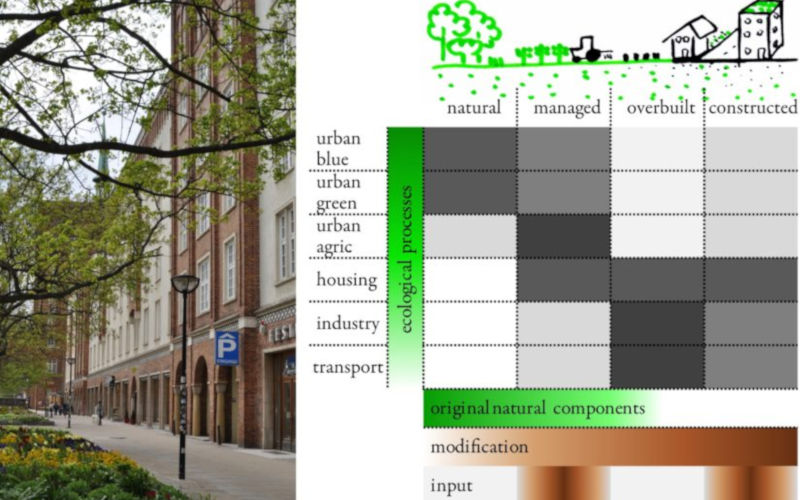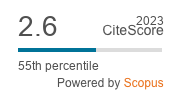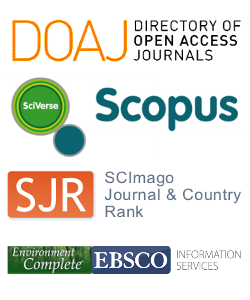Does the Ecosystem Service Concept Reach its Limits in Urban Environments?
DOI:
https://doi.org/10.3097/LO.201751Keywords:
ecosystem definition, urban ecosystem services, normative principle, human input, trade-off, land use, ecosystem service bundlesAbstract
There is a rapidly growing body of literature on the theory about the ecosystem service concept and the practical assessment of ecosystem services in different contexts ranging from natural to urban environments. Yet, where does the concept reach its limits? This paper critically reflects the application of the ecosystem service concept in urban environments illustrating the handling of urban structures (incl. built-up areas) and the risk that the normative principle of the concept could be missed. It is shown that in theory urban structures refer to a variety of ecosystem concepts. As a starting point for ecosystem service assessments, these could be classified into natural, managed, constructed and overbuilt systems. Since ecosystem service concepts do not directly refer to a specific ecosystem definition, but to biophysical structures and processes, all of these classes could be included. However, the dependency on context and scale makes a differentiation in practical ecosystem services assessment challenging. We conclude that the ecosystem service concept does not reach its limits in urban environments, but urban environments represent an extreme case characterized by multifunctionality and a high degree of modification that enables to uncover research challenges applying in any environment. There is a need for a more transparent reporting of theoretical and methodological assumptions to facilitate the comparability between ecosystem service assessments. Comprehensive approaches that consider multiple ecosystem services and include human input, human modification, the ecosystem status as well as their interactions are required to understand the spatial relations between ecosystem services delivered by different ecosystems.
References
Green infrastructure (GI) - enhancing europe's natural capital. (2013). COM, 2013(249), 1-11.
Albert, C., Bonn, A., Burkhard, B., Daube, S., Dietrich, K., Engels, B., . . . Wüstemann, H. (2016). Towards a national set of ecosystem service indicators: Insights from germany. Ecological Indicators, 61, 38-48. doi:10.1016/j.ecolind.2015.08.050
Alberti, M. (2005). The effects of urban patterns on ecosystem function. International Regional Science Review, 28(2), 168-192. doi:10.1177/0160017605275160
Andersson, E., McPhearson, T., Kremer, P., Gomez-Baggethun, E., Haase, D., Tuvendal, M., & Wurster, D. (2015). Scale and context dependence of ecosystem service providing units. Ecosystem Services, 12, 157-164. doi:10.1016/j.ecoser.2014.08.001
Barot, S., Yé, L., Abbadie, L., Blouin, M., & Frascaria, N. (2017). Ecosystem services must tackle anthropized ecosystems and ecological engineering. Ecological Engineering, 99, 486-495. doi:10.1016/j.ecoleng.2016.11.071
Bastian, O., Grunewald, K., Syrbe, R. -., Walz, U., & Wende, W. (2014). Landscape services: The concept and its practical relevance. Landscape Ecology, 29(9), 1463-1479. doi:10.1007/s10980-014-0064-5
Bastian, O., Haase, D., & Grunewald, K. (2012). Ecosystem properties, potentials and services - the EPPS conceptual framework and an urban application example. Ecological Indicators, 21, 7-16. doi:10.1016/j.ecolind.2011.03.014
Bastian, O., Syrbe, R. -., Rosenberg, M., Rahe, D., & Grunewald, K. (2013). The five pillar EPPS framework for quantifying, mapping and managing ecosystem services. Ecosystem Services, 4, 15-24. doi:10.1016/j.ecoser.2013.04.003
Beichler, S. A. (2015). Exploring the link between supply and demand of cultural ecosystem services-towards an integrated vulnerability assessment. International Journal of Biodiversity Science, Ecosystem Services and Management, 11(3), 250-263. doi:10.1080/21513732.2015.1059891
Bennett, E. M., Peterson, G. D., & Gordon, L. J. (2009). Understanding relationships among multiple ecosystem services. Ecology Letters, 12(12), 1394-1404. doi:10.1111/j.1461-0248.2009.01387.x
Bezák, P., & Lyytimäki, J. (2011). Complexity of urban ecosystem services in the context of global change. Ekologia Bratislava, 30(1), 22-35. doi:10.4149/ekol_2011_01_22
Bolund, P., & Hunhammar, S. (1999). Ecosystem services in urban areas. Ecological Economics, 29(2), 293-301. doi:10.1016/S0921-8009(99)00013-0
Breuste, J., Haase, D., & Elmqvist, T. (2013). Urban landscapes and ecosystem services. Ecosystem services in agricultural and urban landscapes (pp. 83-104) doi:10.1002/9781118506271.ch6
Breuste, J., Qureshi, S., & Li, J. (2013). Scaling down the ecosystem services at local level for urban parks of three megacities. Hercynia, 46, 1-20.
Brown, G., Montag, J. M., & Lyon, K. (2012). Public participation GIS: A method for identifying ecosystem services. Society and Natural Resources, 25(7), 633-651. doi:10.1080/08941920.2011.621511
Burkhard, B., De Groot, R., Costanza, R., Seppelt, R., Jørgensen, S. E., & Potschin, M. (2012). Solutions for sustaining natural capital and ecosystem services. Ecological Indicators, 21, 1-6. doi:10.1016/j.ecolind.2012.03.008
Burkhard, B., Kandziora, M., Hou, Y., & Müller, F. (2014). Ecosystem service potentials, flows and demands-concepts for spatial localisation, indication and quantification. Landscape Online, 34(1), 1-32. doi:10.3097/LO.201434
Burkhard, B., Kroll, F., Müller, F., & Windhorst, W. (2009). Landscapes' capacities to provide ecosystem services - A concept for land-cover based assessments. Landscape Online, 15(1), 1-22. doi:10.3097/LO.200915
Burkhard, B., Kroll, F., Nedkov, S., & Müller, F. (2012). Mapping ecosystem service supply, demand and budgets. Ecological Indicators, 21, 17-29. doi:10.1016/j.ecolind.2011.06.019
Burkhard, B., Petrosillo, I., & Costanza, R. (2010). Ecosystem services - bridging ecology, economy and social sciences. Ecological Complexity, 7(3), 257-259. doi:10.1016/j.ecocom.2010.07.001
Costanza, R., D'Arge, R., De Groot, R., Farber, S., Grasso, M., Hannon, B., . . . Van Den Belt, M. (1997). The value of the world's ecosystem services and natural capital. Nature, 387(6630), 253-260. doi:10.1038/387253a0
Currie, W. S. (2011). Tansley review units of nature or processes across scales. The Ecosystem Concept at Age 75.New Phytologist, , 21-34.
Daily, G. C. (1997). Nature's Services: Societal Dependence on Natural Ecosystems,
Daily, G. C., Polasky, S., Goldstein, J., Kareiva, P. M., Mooney, H. A., Pejchar, L., . . . Shallenberger, R. (2009). Ecosystem services in decision making: Time to deliver. Frontiers in Ecology and the Environment, 7(1), 21-28. doi:10.1890/080025
Daniel, T. C., Muhar, A., Arnberger, A., Aznar, O., Boyd, J. W., Chan, K. M. A., . . . Von Der Dunk, A. (2012). Contributions of cultural services to the ecosystem services agenda. Proceedings of the National Academy of Sciences of the United States of America, 109(23), 8812-8819. doi:10.1073/pnas.1114773109
de Groot, R. S., Alkemade, R., Braat, L., Hein, L., & Willemen, L. (2010). Challenges in integrating the concept of ecosystem services and values in landscape planning, management and decision making. Ecological Complexity, 7(3), 260-272. doi:10.1016/j.ecocom.2009.10.006
Ehrlich, P. R., & Ehrlich, A. H. (1981). Extinction: The Causes and Consequences of the Disappearance of Species,
Fagerholm, N., Käyhkö, N., Ndumbaro, F., & Khamis, M. (2012). Community stakeholders' knowledge in landscape assessments - mapping indicators for landscape services. Ecological Indicators, 18, 421-433. doi:10.1016/j.ecolind.2011.12.004
Gómez-Baggethun, E., & Barton, D. N. (2013). Classifying and valuing ecosystem services for urban planning. Ecological Economics, 86, 235-245. doi:10.1016/j.ecolecon.2012.08.019
Granek, E. F., Polasky, S., Kappel, C. V., Reed, D. J., Stoms, D. M., Koch, E. W., . . . Wolanski, E. (2010). Ecosystem services as a common language for coastal ecosystem-based management. Conservation Biology : The Journal of the Society for Conservation Biology, 24(1), 207-216. doi:10.1111/j.1523-1739.2009.01355.x
Grunewald, K., & Bastian, O. (2015). Ecosystem services – concept, methods and case studies. Ecosystem services - concept, methods and case studies (pp. 1-312) doi:10.1007/978-3-662-44143-5
Haase, D. (2014). How is urban land use unique? Rethinking global land use in an urban era (pp. 299-312)
Haase, D., Larondelle, N., Andersson, E., Artmann, M., Borgström, S., Breuste, J., . . . Elmqvist, T. (2014). A quantitative review of urban ecosystem service assessments: Concepts, models, and implementation. Ambio, 43(4), 413-433. doi:10.1007/s13280-014-0504-0
Hagemeier-Klose, M., Beichler, S. A., Davidse, B. J., & Deppisch, S. (2014). The dynamic knowledge loop: Inter- and transdisciplinary cooperation and adaptation of climate change knowledge. International Journal of Disaster Risk Science, 5(1), 21-32. doi:10.1007/s13753-014-0015-4
Haines-Young, R., & Potschin, M. (2010). The links between biodiversity, ecosystem services and human well-being. Ecosystem Ecology: A New Synthesis, , 110-139.
Hauck, J., Görg, C., Varjopuro, R., Ratamäki, O., Maes, J., Wittmer, H., & Jax, K. (2013). "Maps have an air of authority": Potential benefits and challenges of ecosystem service maps at different levels of decision making. Ecosystem Services, 4, 25-32. doi:10.1016/j.ecoser.2012.11.003
Heink, U., Hauck, J., Jax, K., & Sukopp, U. (2016). Requirements for the selection of ecosystem service indicators - the case of MAES indicators. Ecological Indicators, 61, 18-26. doi:10.1016/j.ecolind.2015.09.031
Hermann, A., Schleifer, S., & Wrbka, T. (2011). The concept of ecosystem services regarding landscape research: A review. Living Reviews in Landscape Research, 5(1), 1-37. doi:10.12942/lrlr-2011-1
Hobbs, R. J., Arico, S., Aronson, J., Baron, J. S., Bridgewater, P., Cramer, V. A., . . . Zobel, M. (2006). Novel ecosystems: Theoretical and management aspects of the new ecological world order. Global Ecology and Biogeography, 15(1), 1-7. doi:10.1111/j.1466-822X.2006.00212.x
Jansson, T. (2013). Reaching for a sustainable, resilient urban future using the lens of ecosystem services. Ecological Economics, 86, 285-291. doi:10.1016/j.ecolecon.2012.06.013
Kabisch, N. (2015). Ecosystem service implementation and governance challenges in urban green space planning-the case of berlin, germany. Land use Policy, 42, 557-567. doi:10.1016/j.landusepol.2014.09.005
Kabisch, N., & Haase, D. (2014). Green justice or just green? provision of urban green spaces in berlin, germany. Landscape and Urban Planning, 122, 129-139. doi:10.1016/j.landurbplan.2013.11.016
Kabisch, N., & Haase, D. (2013). Green spaces of european cities revisited for 1990-2006. Landscape and Urban Planning, 110(1), 113-122. doi:10.1016/j.landurbplan.2012.10.017
Kandziora, M., Burkhard, B., & Müller, F. (2013). Interactions of ecosystem properties, ecosystem integrity and ecosystem service indicators: A theoretical matrix exercise. Ecological Indicators, 28, 54-78. doi:10.1016/j.ecolind.2012.09.006
Knapp, S. (2014). The urban garden: A centre of interactions between people and biodiversity. Human-Environmental Interactions in Cities: Challenges and Opportunities of Urban Land use Planning and Green Infrastructure,
Kowarik, I. (1992). Das besondere der städtischen flora und vegetation. Schriftenreihe Des Deutschen Rates Für Landespflege, 61(61), 33-47.
Kowarik, I. (2011). Novel urban ecosystems, biodiversity, and conservation. Environmental Pollution, 159(8-9), 1974-1983. doi:10.1016/j.envpol.2011.02.022
Lamarque, P., Quétier, F., & Lavorel, S. (2011). The diversity of the ecosystem services concept and its implications for their assessment and management. Comptes Rendus - Biologies, 334(5-6), 441-449. doi:10.1016/j.crvi.2010.11.007
Larondelle, N., Haase, D., & Kabisch, N. (2014). Mapping the diversity of regulating ecosystem services in european cities. Global Environmental Change, 26(1), 119-129. doi:10.1016/j.gloenvcha.2014.04.008
Larondelle, N., Hamstead, Z. A., Kremer, P., Haase, D., & McPhearson, T. (2014). Applying a novel urban structure classification to compare the relationships of urban structure and surface temperature in berlin and new york city. Applied Geography, 53, 427-437. doi:10.1016/j.apgeog.2014.07.004
Luederitz, C., Brink, E., Gralla, F., Hermelingmeier, V., Meyer, M., Niven, L., . . . von Wehrden, H. (2015). A review of urban ecosystem services: Six key challenges for future research. Ecosystem Services, 14, 98-112. doi:10.1016/j.ecoser.2015.05.001
Martnez-Harms, M. J., & Balvanera, P. (2012). Methods for mapping ecosystem service supply: A review. International Journal of Biodiversity Science, Ecosystem Services and Management, 8(1-2), 17-25. doi:10.1080/21513732.2012.663792
Milcu, A. I., Hanspach, J., Abson, D., & Fischer, J. (2013). Cultural ecosystem services: A literature review and prospects for future research. Ecology and Society, 18(3) doi:10.5751/ES-05790-180344
Moffatt, S., & Kohler, N. (2008). Conceptualizing the built environment as a social-ecological system. Building Research and Information, 36(3), 248-268. doi:10.1080/09613210801928131
Mooney, H., Larigauderie, A., Cesario, M., Elmquist, T., Hoegh-Guldberg, O., Lavorel, S., . . . Yahara, T. (2009). Biodiversity, climate change, and ecosystem services. Current Opinion in Environmental Sustainability, 1(1), 46-54. doi:10.1016/j.cosust.2009.07.006
Mörtberg, U., Haas, J., Zetterberg, A., Franklin, J. P., Jonsson, D., & Deal, B. (2013). Urban ecosystems and sustainable urban development-analysing and assessing interacting systems in the stockholm region. Urban Ecosystems, 16(4), 763-782. doi:10.1007/s11252-012-0270-3
Müller, F., & Burkhard, B. (2012). The indicator side of ecosystem services. Ecosystem Services, 1(1), 26-30. doi:10.1016/j.ecoser.2012.06.001
Müller, F., Burkhard, B., & Kroll, F. (2010). Resilience, integrity and ecosystem dynamics: Bridging ecosystem theory and management doi:10.1007/978-3-540-75761-0_14
Müller, F., de Groot, R., & Willemen, L. (2010). Ecosystem services at the landscape scale: The need for integrative approaches. Landscape Online, 23(1), 1-11. doi:10.3097/LO.201023
Naveh, Z. (2000). The total human ecosystem: Integrating ecology and economics. Bioscience, 50(4), 357-361. doi:10.1641/0006-3568(2000)050[0357:TTHEIE]2.3.CO;2
Naveh, Z., & Lieberman, A. S. (1984). Landscape ecology: Theory and application. Landscape Ecology: Theory and Application.,
Nesshöver, C., Assmuth, T., Irvine, K. N., Rusch, G. M., Waylen, K. A., Delbaere, B., . . . Wittmer, H. (2017). The science, policy and practice of nature-based solutions: An interdisciplinary perspective. Science of the Total Environment, 579, 1215-1227. doi:10.1016/j.scitotenv.2016.11.106
Oberndorfer, E., Lundholm, J., Bass, B., Coffman, R. R., Doshi, H., Dunnett, N., . . . Rowe, B. (2007). Green roofs as urban ecosystems: Ecological structures, functions, and services. Bioscience, 57(10), 823-833. doi:10.1641/B571005
Odum, E. P. (1971). Fundamentals of Ecology,
Pickett, S. T. A., & Cadenasso, M. L. (2002). The ecosystem as a multidimensional concept: Meaning, model, and metaphor. Ecosystems, 5(1), 1-10. doi:10.1007/s10021-001-0051-y
Potschin, M. (2009). Land use and the state of the natural environment. Land use Policy, 26(SUPPL. 1), S170-S177. doi:10.1016/j.landusepol.2009.08.008
Reyers, B., Biggs, R., Cumming, G. S., Elmqvist, T., Hejnowicz, A. P., & Polasky, S. (2013). Getting the measure of ecosystem services: A social-ecological approach. Frontiers in Ecology and the Environment, 11(5), 268-273. doi:10.1890/120144
Scholes, R. J., Reyers, B., Biggs, R., Spierenburg, M. J., & Duriappah, A. (2013). Multi-scale and cross-scale assessments of social-ecological systems and their ecosystem services. Current Opinion in Environmental Sustainability, 5(1), 16-25. doi:10.1016/j.cosust.2013.01.004
Schröter, M., van der Zanden, E. H., van Oudenhoven, A. P. E., Remme, R. P., Serna-Chavez, H. M., de Groot, R. S., & Opdam, P. (2014). Ecosystem services as a contested concept: A synthesis of critique and counter-arguments. Conservation Letters, 7(6), 514-523. doi:10.1111/conl.12091
Schwarz, N., Bauer, A., & Haase, D. (2011). Assessing climate impacts of planning policies-an estimation for the urban region of leipzig (germany). Environmental Impact Assessment Review, 31(2), 97-111. doi:10.1016/j.eiar.2010.02.002
Seppelt, R., Fath, B., Burkhard, B., Fisher, J. L., Grêt-Regamey, A., Lautenbach, S., . . . Van Oudenhoven, A. P. E. (2012). Form follows function? proposing a blueprint for ecosystem service assessments based on reviews and case studies. Ecological Indicators, 21, 145-154. doi:10.1016/j.ecolind.2011.09.003
Spangenberg, J. H., von Haaren, C., & Settele, J. (2014). The ecosystem service cascade: Further developing the metaphor. integrating societal processes to accommodate social processes and planning, and the case of bioenergy. Ecological Economics, 104, 22-32. doi:10.1016/j.ecolecon.2014.04.025
Sukopp, H. (1969). Der einfluss des menschen auf die vegetation. Vegetatio Acta Geobotanica, 17(1), 360-371. doi:10.1007/BF01965917
Tansley, A. G. (1935). The use and abuse of vegetational concepts and terms. Ecology, 16, 284-307.
Termorshuizen, J. W., & Opdam, P. (2009). Landscape services as a bridge between landscape ecology and sustainable development. Landscape Ecology, 24(8), 1037-1052. doi:10.1007/s10980-008-9314-8
Tiwary, A., & Kumar, P. (2014). Impact evaluation of green-grey infrastructure interaction on built-space integrity: An emerging perspective to urban ecosystem service. Science of the Total Environment, 487(1), 350-360. doi:10.1016/j.scitotenv.2014.03.032
Vallés-Planells, M., Galiana, F., & Van Eetvelde, V. (2014). A classification of landscape services to support local landscape planning. Ecology and Society, 19(1) doi:10.5751/ES-06251-190144
Voigt, A., Kabisch, N., Wurster, D., Haase, D., & Breuste, J. (2014). Structural diversity: A multi-dimensional approach to assess recreational services in urban parks. Ambio, 43(4), 480-491. doi:10.1007/s13280-014-0508-9
Wang, Y., Bakker, F., de Groot, R., & Wörtche, H. (2014). Effect of ecosystem services provided by urban green infrastructure on indoor environment: A literature review. Building and Environment, 77, 88-100. doi:10.1016/j.buildenv.2014.03.021

Downloads
Published
How to Cite
Issue
Section
Categories
License
Copyright (c) 2019 Simone A. Beichler, Olaf Bastian, Dagmar Haase, Stefan Heiland, Nadja Kabisch, Felix Müller

This work is licensed under a Creative Commons Attribution 4.0 International License.










